Manufacturers choosing between AS9100D vs ISO 9001 face a critical decision that impacts operational efficiency, market access, and competitive positioning. According to ISO Survey 2022, over 1.2 million organizations worldwide hold ISO 9001 certification, while the International Aerospace Quality Group reports that more than 8,000 aerospace organizations maintain AS9100 certification globally.
Understanding the difference between AS9100D and ISO 9001 enables manufacturers to select the right quality management system that aligns with industry requirements, customer expectations, and business objectives while avoiding costly implementation mistakes.
What is ISO 9001 and How Does it Work?

ISO 9001 represents the world's most widely adopted quality management system standard, providing a framework for consistent quality delivery across any industry or organization size. The standard emphasizes customer satisfaction, process improvement, and evidence-based decision-making through systematic approaches.
The ISO 9001 meaning centers on creating organizational structures that ensure products and services consistently meet customer requirements while demonstrating continuous improvement capabilities. This universal applicability makes ISO 9001 the foundation for quality management across diverse manufacturing sectors.
Core ISO 9001 Requirements Every Business Should Know
ISO 9001 requirements establish seven key principles that guide implementation: customer focus, leadership engagement, people involvement, process approach, improvement mindset, evidence-based decisions, and relationship management. These principles create comprehensive quality frameworks applicable to any organization.
The ISO 9001 standard mandates documented procedures for quality planning, resource management, product realization, and performance measurement. Organizations must demonstrate systematic approaches to handling customer complaints, managing nonconforming products, and implementing corrective actions that prevent quality issues.
Risk-based thinking permeates all ISO 9001 requirements, requiring organizations to identify potential quality risks and implement preventive measures. This proactive approach reduces quality failures while supporting sustainable business growth through improved operational efficiency.
Industries That Benefit from ISO 9001 Certification
ISO 9001 certification applies across manufacturing, service, healthcare, education, and government sectors, making it the most versatile quality standard available. Manufacturing companies particularly benefit from improved process control, reduced waste, and enhanced customer confidence.
According to the International Organization for Standardization, organizations implementing ISO 9001 report average improvements of 15-20% in operational efficiency and 10-15% reductions in quality-related costs. These benefits demonstrate the standard's effectiveness across diverse industry applications.
Ready to take the next step in quality management? Partner with BPRHub to streamline your ISO 9001 or AS9100 certification
📍 Book a Demo
📧 hello@bprhub.com
Understanding AS9100 Certification for Aerospace Companies
AS9100 certification extends ISO 9001 requirements with aerospace-specific additions that address industry safety, reliability, and regulatory requirements. The International Aerospace Quality Group developed this standard to meet unique aerospace manufacturing challenges while maintaining ISO 9001 compatibility.
The standard incorporates aviation authority requirements from organizations like the Federal Aviation Administration and European Union Aviation Safety Agency, ensuring that certified organizations meet both quality and regulatory obligations simultaneously.
AS9100 Standard Requirements and Compliance Framework
AS9100 requirements include all ISO 9001 elements plus aerospace-specific additions covering configuration management, risk management, project management, and product safety. These additions reflect the critical safety requirements inherent in aerospace applications.
The AS9100 standard emphasizes first article inspection, key characteristics identification, and comprehensive supplier management that traces quality requirements throughout complex supply chains. Foreign object debris prevention, counterfeit parts prevention, and human factors considerations receive particular attention.
According to the International Aerospace Quality Group, AS9100 standard compliance requires organizations to demonstrate statistical process control, advanced product quality planning, and measurement system analysis capabilities that exceed general manufacturing requirements.
Why AS9100D Certification Matters for the Aviation Industry
AS9100D certification represents the current revision incorporating lessons learned from aerospace quality incidents and evolving industry practices. The revision strengthens risk management requirements while emphasizing supply chain quality management and product safety considerations.
Aerospace manufacturers require AS9100D certification from suppliers to ensure consistent quality delivery throughout complex supply networks. According to the Aerospace Industries Association, over 90% of major aerospace prime contractors require suppliers to maintain AS9100D certification as a prerequisite for business relationships.
Key Differences Between AS9100 and ISO 9001 Standards
The difference between AS9100D and ISO 9001 lies primarily in scope and industry-specific requirements rather than fundamental quality principles. AS9100 ISO 9001 comparison reveals that aerospace standards build upon ISO 9001 foundations while adding specialized requirements.
AS9100 includes additional clauses covering configuration management, risk management, project management, and product safety that reflect aerospace industry complexity and safety requirements. These additions address unique aerospace challenges while maintaining compatibility with ISO 9001 principles.
Quality Management System Variations Across Both Standards
Quality management system implementation varies between standards primarily in documentation depth and process complexity. ISO 9001 provides flexibility in implementation approaches, while AS9100 prescribes specific methodologies for critical processes.
AS9100 requires mandatory use of advanced product quality planning, statistical process control, and measurement system analysis techniques. These requirements ensure consistent quality delivery in high-reliability applications where product failures could have catastrophic consequences.
The aerospace standard also mandates specific supplier management approaches, including on-site assessments, supply chain risk assessments, and counterfeit parts prevention programs that exceed typical ISO 9001 supplier management requirements.
Documentation Requirements: AS9100 vs ISO 9001 Comparison
Documentation requirements represent a significant difference between AS9100D and ISO 9001, with aerospace standards requiring more detailed procedures and records. AS9100 mandates specific documentation for configuration management, project management, and risk management processes.
The ISO 9001 standard allows organizations flexibility in determining necessary documentation based on organizational complexity and risk assessments. AS9100 prescribes mandatory documentation for critical processes, reducing implementation flexibility while ensuring consistency across aerospace suppliers.
Quality records retention requirements differ significantly, with AS9100 requiring extended retention periods that support product lifecycle management and regulatory compliance. This enhanced record-keeping supports traceability requirements essential for aerospace product safety and reliability.
Risk Management Approaches in Each Standard
Risk management approaches highlight key differences between AS9100 standard and ISO 9001 implementations. While ISO 9001 requires risk-based thinking throughout quality systems, AS9100 mandates formal risk management processes with specific methodologies and documentation requirements.
AS9100 requires organizations to implement comprehensive risk assessments covering product design, manufacturing processes, supplier performance, and operational risks. These assessments must follow prescribed methodologies that ensure consistent risk evaluation across aerospace suppliers.
The aerospace standard emphasizes preventive action through systematic risk identification and mitigation, reflecting the industry's zero-defect mentality and safety-first approach to quality management.
Industry Applications: When to Choose ISO 9001 vs AS9100
ISO 9001 and AS9100 selection depends primarily on customer requirements, industry focus, and market access objectives. General manufacturers typically implement ISO 9001 for broad market acceptance, while aerospace suppliers require AS9100 for industry participation.
Organizations serving multiple industries often implement AS9100 to satisfy aerospace customers while maintaining ISO 9001 compatibility for general manufacturing applications. This dual approach maximizes market opportunities while minimizing implementation complexity.
Manufacturing Companies and Quality Management Systems
Manufacturing QMS selection should align with customer requirements, regulatory obligations, and competitive positioning objectives. Companies serving automotive, medical device, or general manufacturing sectors typically choose ISO 9001 for its broad applicability and customer acceptance.
According to IAQG, manufacturers supplying aerospace customers must implement AS9100 to meet supply chain qualification requirements. This requirement often drives AS9100 adoption even among companies with minimal aerospace exposure.
BPRHub's quality management system implementation approach helps manufacturers evaluate standard selection based on industry requirements, customer expectations, and business objectives while ensuring successful implementation outcomes.
Aerospace Certifications and Regulatory Compliance
Aerospace certifications require a comprehensive understanding of both quality standards and regulatory requirements from aviation authorities. AS9100 certification provides the quality foundation, while organizations must also address specific regulatory compliance obligations.
The integration of AS9100 with regulatory requirements creates comprehensive compliance frameworks that satisfy both customer quality expectations and legal obligations. This dual compliance approach ensures market access while maintaining operational efficiency.
Implementation Process for Both Quality Standards
Quality standards implementation requires systematic planning, resource allocation, and change management to ensure successful outcomes. Both ISO 9001 and AS9100 follow similar implementation phases while differing in complexity and resource requirements.
Successful implementations typically require 12-18 months for ISO 9001 and 18-24 months for AS9100, reflecting the additional complexity and documentation requirements of aerospace standards. These timelines assume adequate resource allocation and management commitment throughout the implementation process.
ISO Certification Steps and Timeline Requirements
ISO certification follows a structured process beginning with gap analysis, system development, implementation, internal auditing, and external assessment. Each phase requires specific deliverables and stakeholder engagement to ensure successful outcomes.
The certification process typically involves pre-assessment activities, stage 1 documentation review, stage 2 implementation audit, and ongoing surveillance assessments. Organizations must demonstrate sustained compliance over time to maintain certification validity.
BPRHub's ISO 9001 implementation guidance provides comprehensive support throughout the certification process, ensuring efficient implementation while avoiding common pitfalls that delay certification or compromise system effectiveness.
AS9100 Quality Management System Implementation Guide
AS9100 quality management system implementation requires specialized expertise in aerospace requirements and industry best practices. The process builds upon ISO 9001 foundations while incorporating aerospace-specific elements that address industry-specific requirements.
Implementation teams must understand both quality system principles and aerospace industry applications to ensure effective system design. This dual competency requirement often necessitates external consulting support or specialized training for internal teams.
According to SAE International, successful AS9100 implementations require cross-functional teams with representation from quality, engineering, manufacturing, and supply chain management to address the standard's comprehensive requirements.
Don’t let compliance complexity slow your growth—BPRHub’s expert consultants can help you implement the right QMS.

Cost and Training Considerations for Each Standard
AS9100 training requirements exceed ISO 9001 due to additional aerospace-specific elements and mandatory competency requirements. Organizations must invest in specialized training for quality personnel, internal auditors, and management representatives to ensure successful implementation.
Training costs typically represent 15-20% of total implementation expenses for ISO 9001 and 20-25% for AS9100, reflecting the additional complexity and specialization required for aerospace applications. These investments provide essential competency development that supports long-term system effectiveness.
ISO Compliance Budget Planning and Resources
ISO compliance budget planning must consider implementation costs, certification fees, ongoing maintenance expenses, and continuous improvement investments. Total costs vary significantly based on organization size, complexity, and existing quality system maturity.
According to industry benchmarks from Quality Digest, small manufacturers typically invest $25,000-$50,000 for ISO 9001 implementation, while medium-sized organizations invest $50,000-$150,000, depending on system complexity and consulting requirements.
BPRHub's cost analysis framework helps manufacturers develop realistic implementation budgets while identifying opportunities to optimize resource allocation throughout the certification process.
Staff Training Requirements for Quality Management
Quality management training ensures that personnel understand system requirements, their roles within quality processes, and continuous improvement methodologies. Training programs must address both standard requirements and organization-specific implementations to ensure effectiveness.
AS9100 implementations require specialized aerospace training that covers configuration management, risk management, and product safety considerations unique to aerospace applications. This specialized training typically costs 25-40% more than general ISO 9001 training due to subject matter complexity.
Organizations must also invest in internal auditor training, management review training, and ongoing competency development to maintain system effectiveness over time. These ongoing training investments support continuous improvement while ensuring sustained compliance with standard requirements.
Making the Right Choice: ISO 9001 or AS9100 for Your Business
ISO AS9100 decision-making requires careful evaluation of customer requirements, market objectives, resource availability, and competitive positioning goals. The choice significantly impacts implementation complexity, ongoing compliance obligations, and market access opportunities.
Organizations should evaluate their current customer base, target market opportunities, and internal capabilities when selecting between standards. This comprehensive assessment ensures that standard selection aligns with business strategy while optimizing resource utilization.
Assessment Criteria for Quality Management System Selection
QMS quality management system selection criteria should encompass customer requirements, regulatory obligations, market access needs, and organizational readiness factors. These criteria provide objective frameworks for standard selection while ensuring alignment with business objectives.
Key evaluation factors include current customer base requirements, target market expansion plans, internal quality system maturity, available resources, and competitive positioning objectives. This multi-dimensional analysis ensures optimal standard selection for organizational circumstances.
BPRHub's quality management consultation services provide expert guidance throughout the standard selection process, ensuring that organizations choose appropriate standards while developing realistic implementation plans that support business success.
Long-term Benefits of ISO Quality Standards Implementation
ISO quality standards implementation provides sustained benefits, including improved operational efficiency, enhanced customer satisfaction, reduced quality costs, and strengthened competitive positioning. These benefits typically justify implementation investments within 2-3 years through operational improvements.
According to ISO's economic benefits study, organizations implementing ISO quality standards report an average return on investment of 250-400% within three years through reduced waste, improved efficiency, and enhanced market access opportunities.
Long-term benefits extend beyond operational improvements to include enhanced employee engagement, improved supplier relationships, and a strengthened organizational culture focused on continuous improvement and customer satisfaction.
How BPRHub Helps with Quality Management System Implementation
BPRHub's comprehensive Quality, Compliance, and Governance platform transforms quality standards implementation from a complex administrative burden into a streamlined competitive advantage. Our expert consultants provide end-to-end support for both ISO 9001 and AS9100 implementations, ensuring successful certification while optimizing system effectiveness.
With deep expertise in aerospace and manufacturing quality requirements, BPRHub guides organizations through standard selection, gap analysis, system development, and certification processes. Our proven methodologies reduce implementation timelines while ensuring robust quality systems that deliver sustained business benefits.
BPRHub's integrated approach combines expert consulting with advanced software platforms that automate quality processes, maintain compliance documentation, and provide real-time visibility into quality performance. This combination ensures not only successful certification but also ongoing system effectiveness that supports business growth.
Our specialized aerospace expertise helps organizations navigate the complexities of AS9100D certification while maintaining compatibility with ISO 9001 requirements for maximum market flexibility and operational efficiency.
Maximize efficiency and meet customer demands with confidence—contact BPRHub today to start your ISO 9001 or AS9100D certification process.
📍 Book a Demo
📧 hello@bprhub.com
Key Takeaways
→ AS9100D vs ISO 9001 choice depends primarily on customer requirements, with aerospace suppliers requiring AS9100 while general manufacturers benefit from ISO 9001's broad applicability
→ AS9100 builds upon ISO 9001 foundations by adding aerospace-specific requirements for configuration management, risk management, and product safety that address industry-specific challenges
→ Implementation timelines differ significantly, with ISO 9001 requiring 12-18 months versus 18-24 months for AS9100 due to additional documentation and process complexity requirements
→ Training and implementation costs for AS9100 exceed ISO 9001 by 25-40% due to specialized aerospace knowledge requirements and mandatory competency development needs
→ Both standards provide significant return on investment through improved operational efficiency, reduced quality costs, and enhanced market access opportunities within 2-3 years
→ BPRHub's expert consulting services ensure the successful implementation of either standard while optimizing system effectiveness and minimizing implementation timelines and costs
Frequently Asked Questions
What are the key differences between ISO 9001 and AS9100?
The primary difference between AS9100D and ISO 9001 lies in scope and industry-specific requirements. AS9100 includes all ISO 9001 requirements plus aerospace-specific additions covering configuration management, risk management, project management, and product safety. AS9100 prescribes mandatory methodologies for critical processes while ISO 9001 provides implementation flexibility. Documentation requirements are more extensive in AS9100, with prescribed procedures for aerospace-specific processes and extended record retention periods.
Which is better, Six Sigma or ISO 9001?
ISO 9001 and Six Sigma are complementary methodologies rather than competing approaches. ISO 9001 provides the quality management system framework for consistent operations, while Six Sigma offers problem-solving tools for process improvement. Most successful organizations implement ISO 9001 as their quality foundation and use Six Sigma methodologies for specific improvement projects. ISO 9001 ensures systematic quality management, while Six Sigma drives breakthrough improvements in critical processes through data-driven analysis.
What are the 3 C's of ISO 9001?
The 3 C's of ISO 9001 represent Customer Focus, Continual Improvement, and Commitment from Leadership as fundamental principles underlying successful implementation. Customer Focus ensures all processes deliver value to customers and stakeholders. Continual Improvement drives systematic enhancement of processes, products, and services over time. Commitment from Leadership provides the necessary resources, engagement, and accountability for quality system effectiveness. These principles create the foundation for sustained quality management system success across all organizational levels.
What does AS9100D focus on?
AS9100D certification focuses on aerospace-specific quality requirements, including enhanced risk management, configuration management, project management, and product safety considerations. The standard emphasizes first article inspection, key characteristics identification, statistical process control, and comprehensive supplier management throughout complex aerospace supply chains. AS9100D requires foreign object debris prevention, counterfeit parts prevention, and human factors analysis that address unique aerospace safety requirements while maintaining all ISO 9001 quality principles and requirements.
Can a company have both ISO 9001 and AS9100 certification simultaneously?
Companies cannot hold separate ISO 9001 and AS9100 certifications simultaneously since AS9100 incorporates all ISO 9001 requirements. Organizations implementing AS9100 automatically achieve ISO 9001 compliance because the aerospace standard builds upon the general quality management system foundation. AS9100 certification provides broader market access, satisfying both aerospace customers requiring aerospace-specific quality systems and general manufacturing customers accepting ISO 9001 compliance. This comprehensive approach maximizes market opportunities while maintaining a single quality system implementation.
Get insights that help you minimize risks and maximize profits.
Dive deeper into manufacturing compliance with our free resources.
We get it, compliance can get tough.
Here are some additional resources to help.
We get it, compliance can get tough. Here are some additional resources to help.
Get updates in your inbox

.svg)
%20(1).svg)
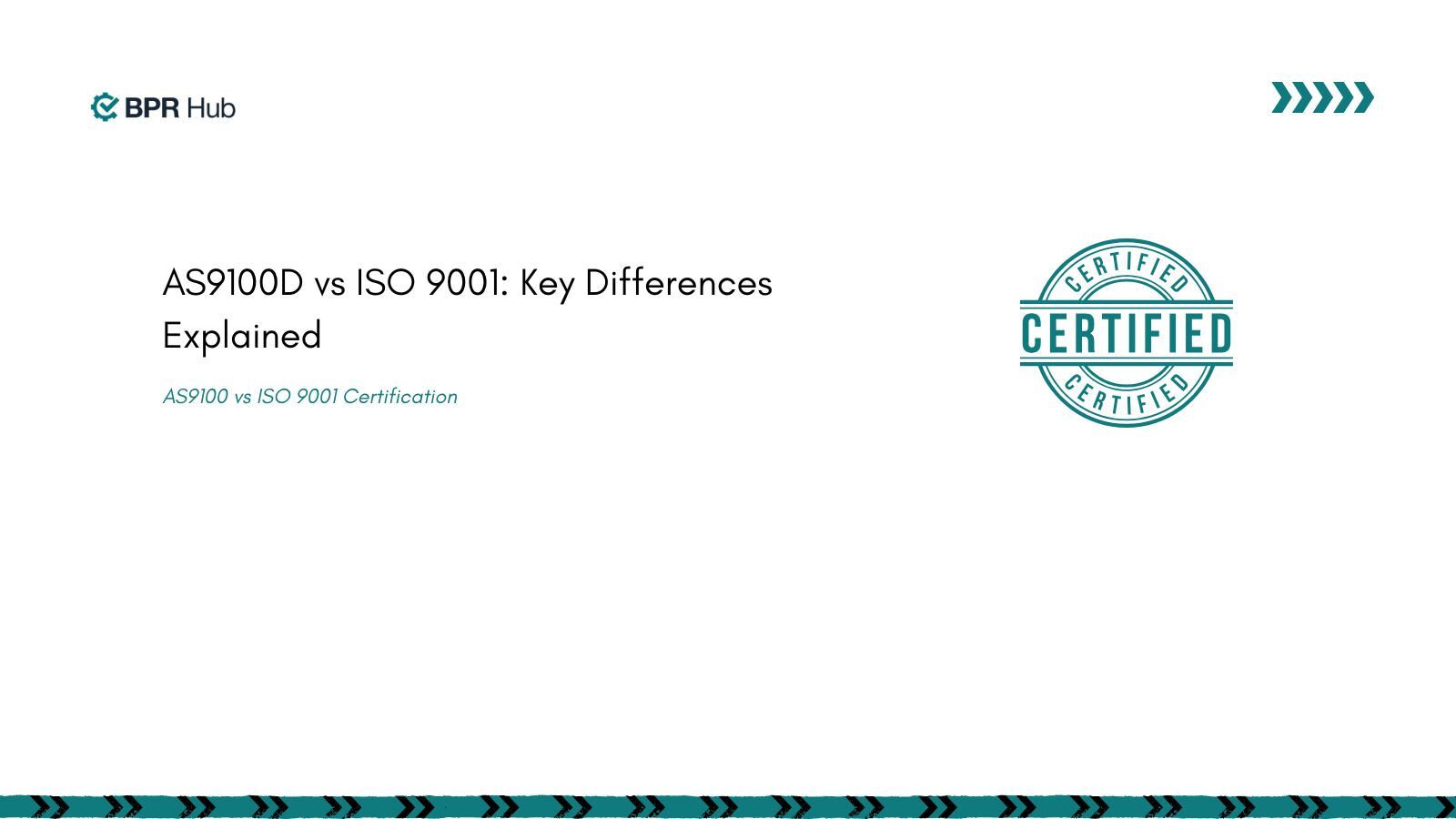

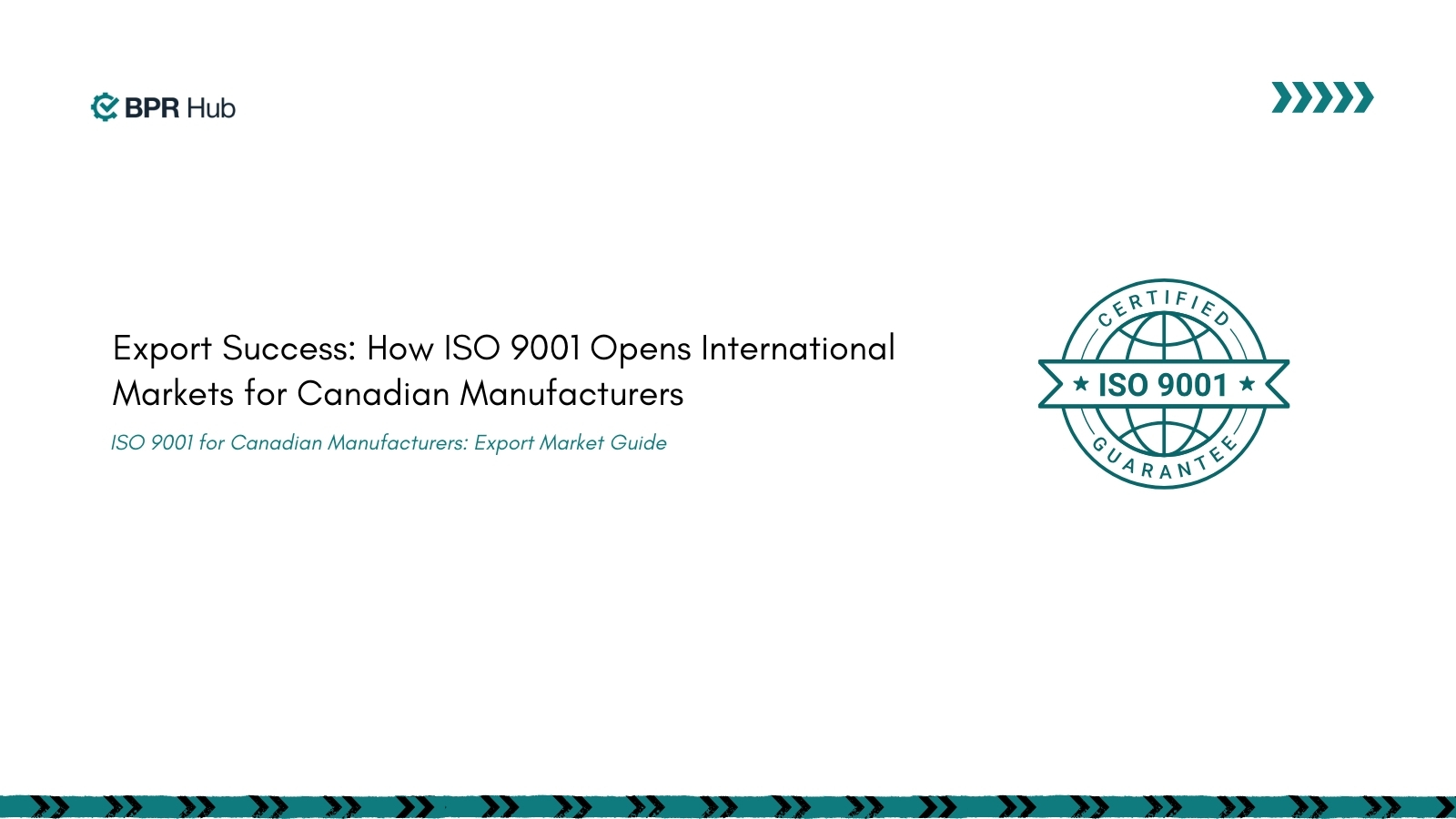
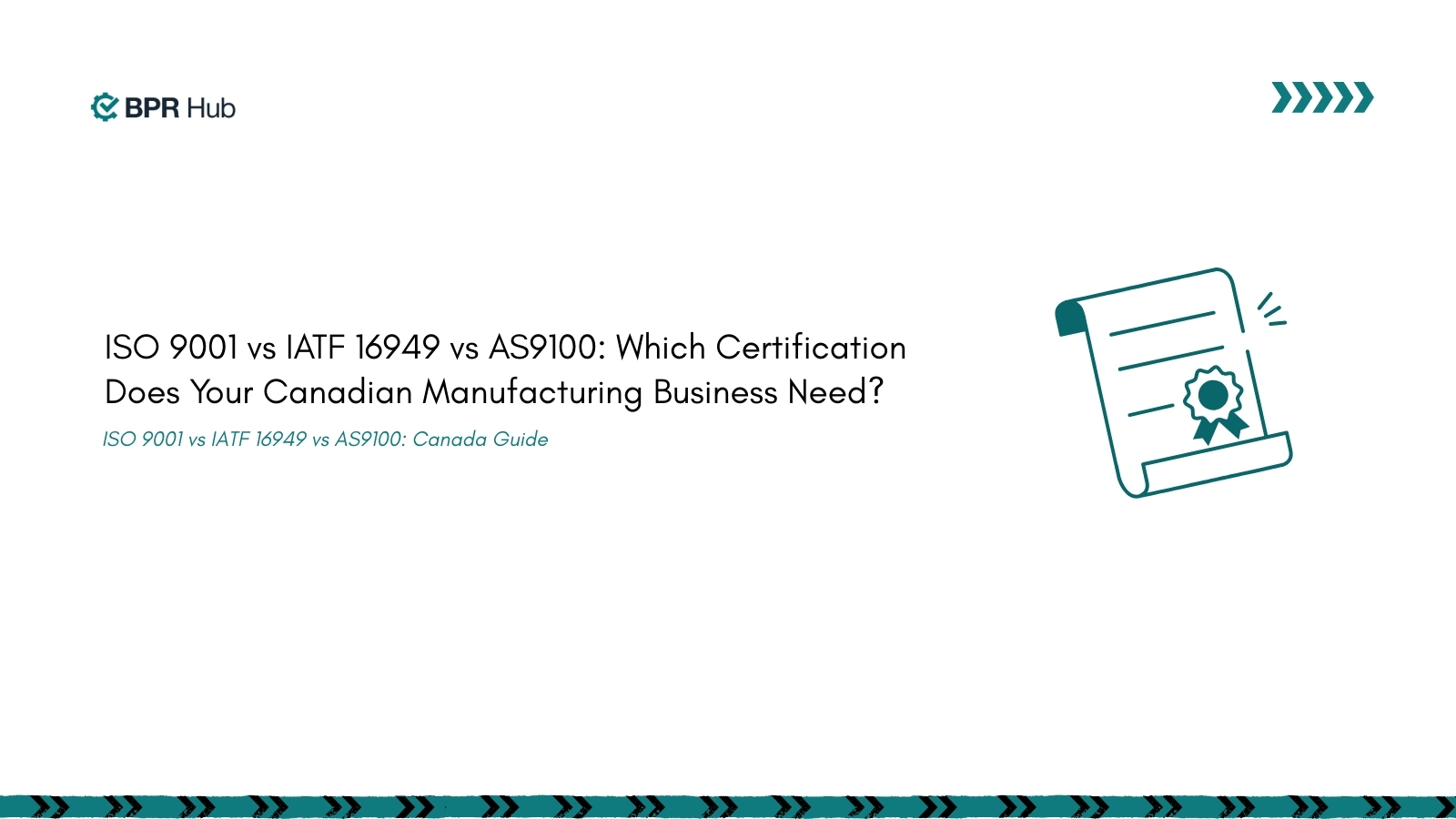
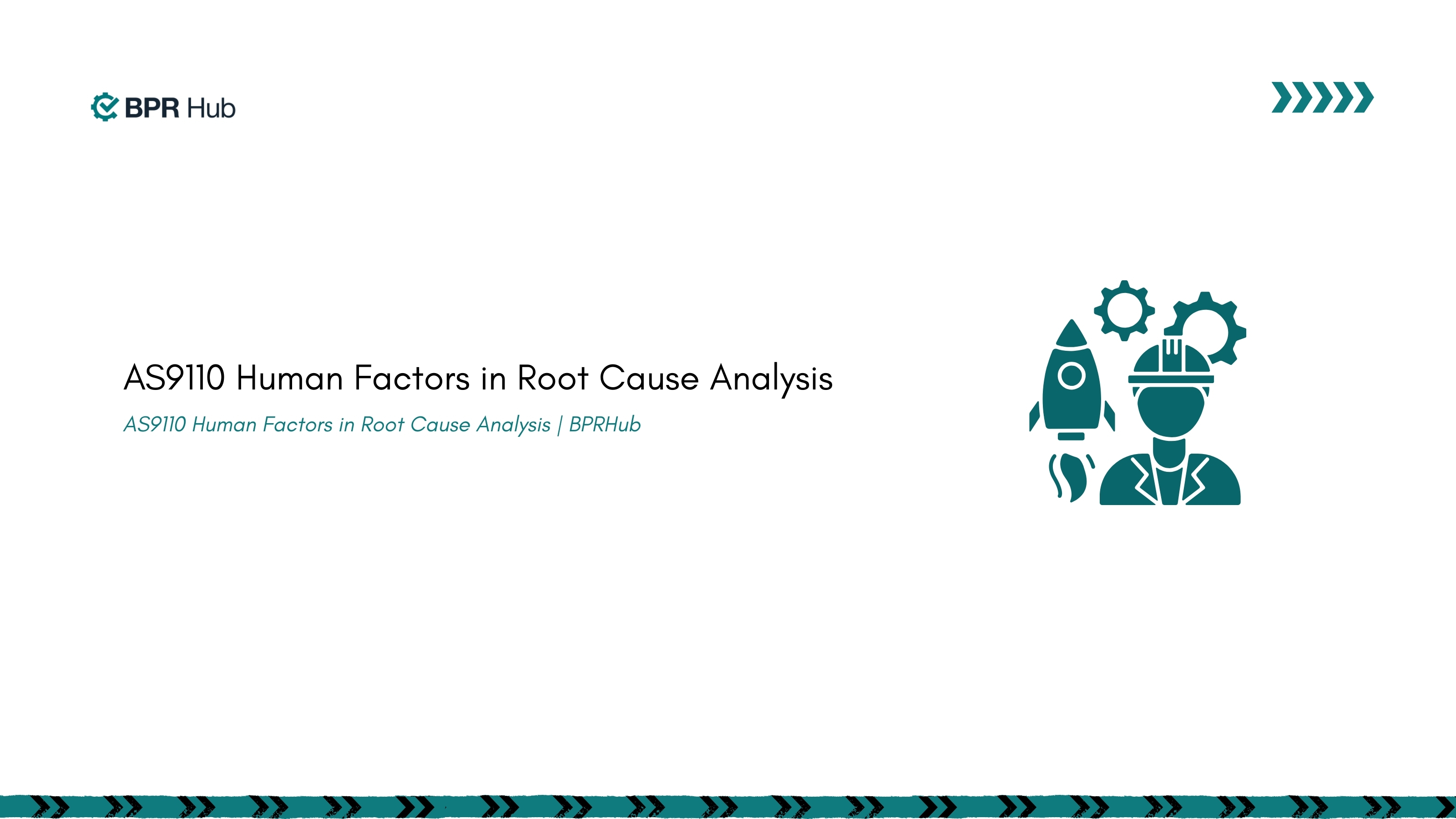
%20(1).svg)

.avif)

